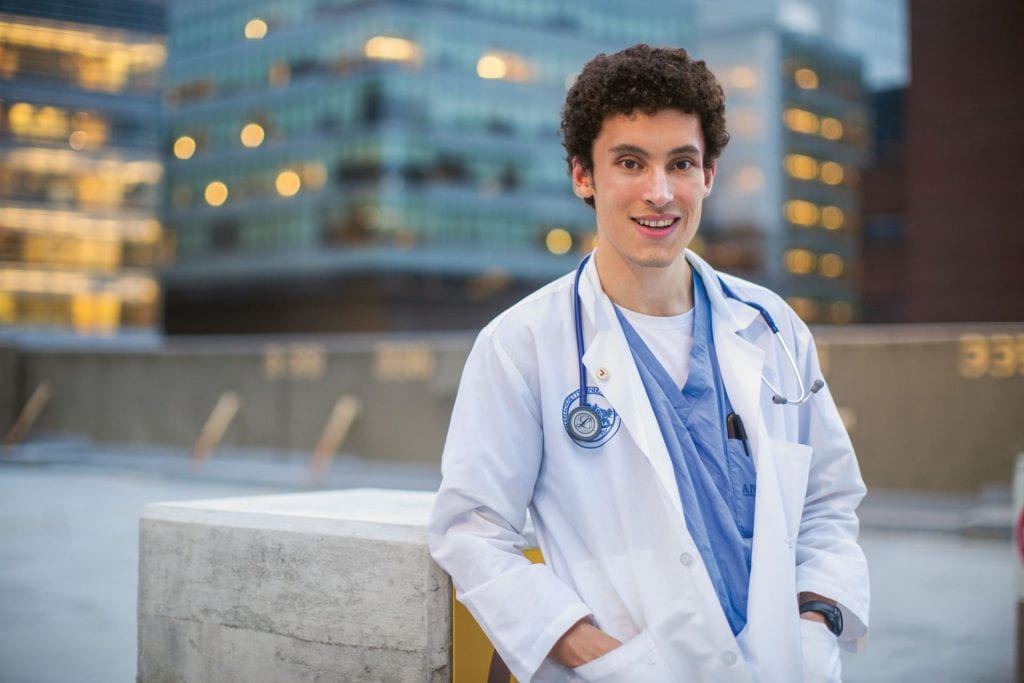“If not for Civic Scholars, I don’t think I would have had the confidence to go down this road.”
The lessons Dr. Andreas Mitchell AB ‘13 learned with Civic Scholars inform how he approaches his work today. His time as a Civic Scholar gave him a sense of what civic leadership looks like and whether it’s possible in a career in medicine.
Mitchell graduated from WashU in 2013 with a degree in anthropology and a minor in biology. While at WashU, Mitchell was a member of the first class of Civic Scholars — which he recognizes as one of the best experiences he had in college.
“It genuinely pulled together a group of people who are sort of generally interested in civic engagement and civic leadership. Getting our group together and letting us give some direction to it, I think was really powerful,” said Mitchell about the Civic Scholar cohort.
Mitchell began his WashU journey as a part of the University Scholars Program in Medicine in order to receive his bachelor’s as well as MD. He felt the program was missing public policy education, which is an aspect of healthcare that resonated most with Mitchell. So, he left the program in search of that missing part. His interest with public health stemmed from an internship before college in malaria research. Mitchell began to think of the world of medicine through the lens of policy solutions to health problems.
“I then got into Civic Scholars which caught me at this point where I liked medicine, but I really liked social justice issues, and I needed to find a way to put them together and I didn’t know how,” Mitchell said.
Mitchell’s Civic Summer was spent working for the organization Promise Heights in his hometown of Baltimore, Maryland. Promise Heights uses a place-based approach to improve the outcomes of children and families of West Baltimore communities. Mitchell took the opportunity to focus on a particular community, rather than broad state or national level policies, and he helped put on a health fair that focused on health education within West Baltimore.
“I came into med school with this vague idea that I wanted to put together social justice, social policy work and medicine, and I had seen a hint of it with the doctor I worked with in Promise Heights in Baltimore,” said Mitchell.
With an emphasis on public health mentality, Mitchell pursed his Master’s in Public Policy as well as an MD at Harvard Medical School, with his third-year rotations at Massachusetts General Hospital. It sparked his desire to be a primary care doctor, while also pursuing advocacy, and he interned with Massachusetts Health and Human Services to learn more about the policy processes. His Civic Scholars background and pursuit of master’s in public policy at the Kennedy School gave him the confidence to work in policy circles within the medical field.
At the end of his academic exploration, Mitchell made the decision to focus on community medicine.
Mitchell found the place-based medical practice he was searching for at Roots Community Health Center where he works as a primary care physician. The center was founded in Oakland, California, as a way to offer medical and behavioral care to those impacted by systemic inequities and poverty. Their holistic approach offers health navigation, workforce enterprises, housing, outreach and advocacy as well.
“It’s an incredibly unique opportunity for me to have this job where I can do primary care in a community where I feel like my impact is really high. Only about 60 percent of my time is clinical care. The other two days a week I oversee a couple of clinical programs: diabetes and substance use, respectively,” Mitchell said.
The Roots Community Health Center was built on the idea that a primary care clinic can include resources that address social determinants of health. Through partnerships with other community-based organizations in the east Oakland area, Roots caters to its community via social-facing pathways. It’s there that Mitchell finds himself as a part of a group of community doctors who are just as dedicated to advocating for community-specific issues as he is.
